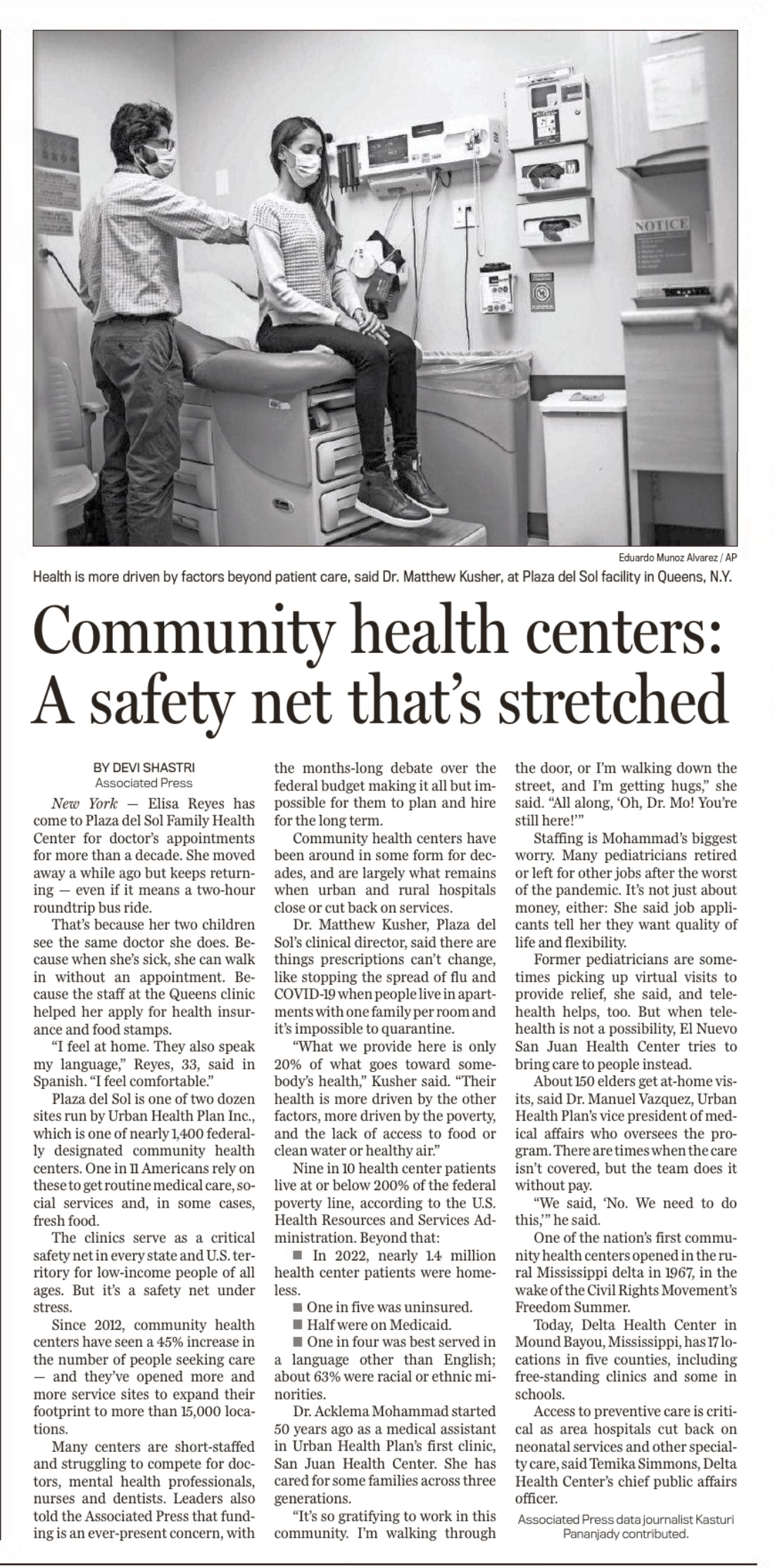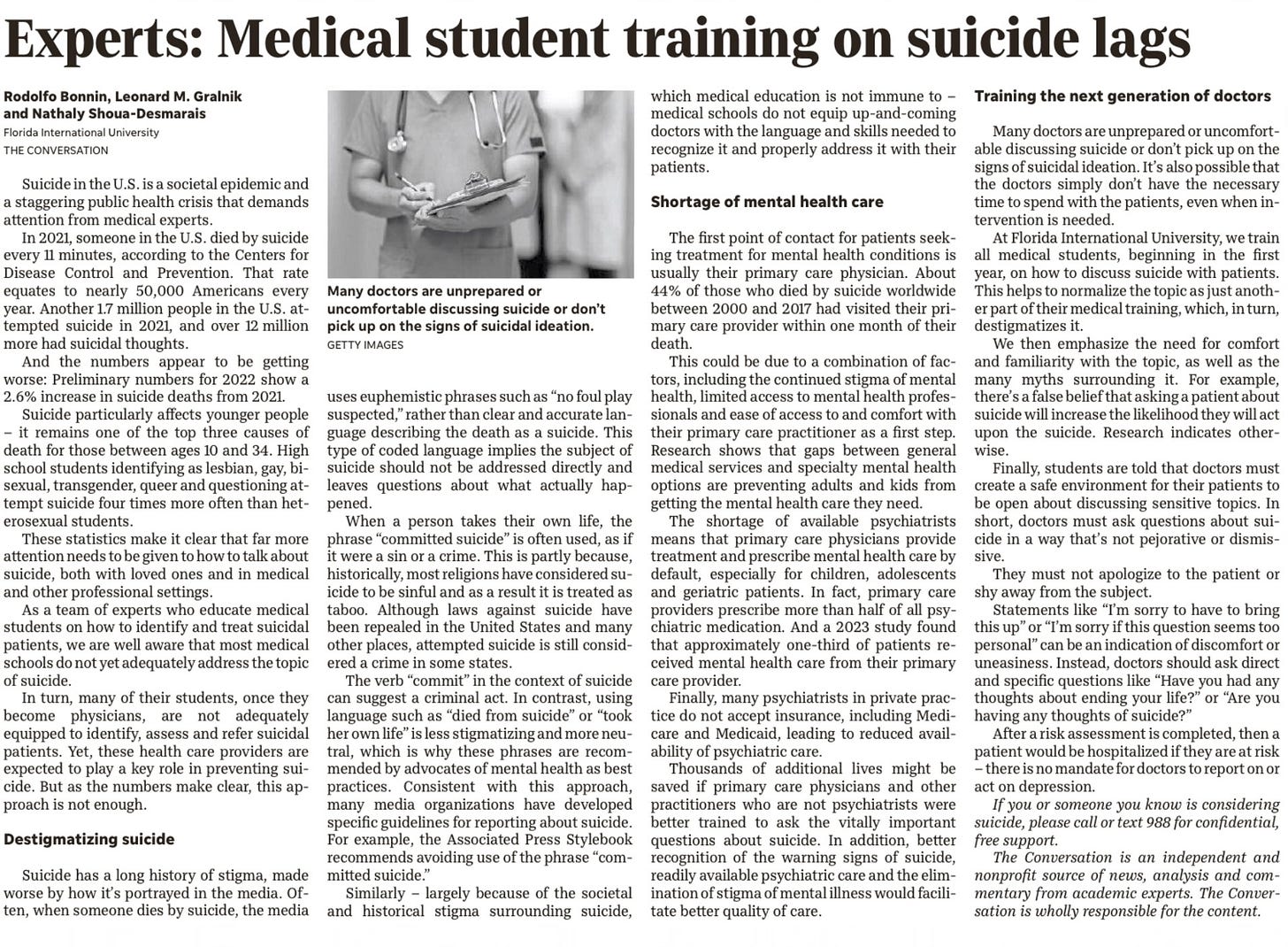Provider Updates: Michigan
Week of February 5, 2024
Since I took office, we’ve made record, bipartisan investments in mental health, expanding access and lowering costs. In this year’s budget, let’s expand behavioral health care to more Michiganders so they can get the support they need to get better.
Gov. Gretchen Whitmer
Whitmer Focuses on Mental Health in Michigan’s FY 2025 Budget and Expansion of CCBHCs
Gov. Gretchen Whitmer plans to significantly enhance funding for Certified Community Behavioral Health Clinics (CCBHC) in Michigan's FY 2025 budget, prioritizing mental health on par with physical health. The proposed investments aim to expand mental health and substance use disorder services, particularly for underserved communities, including veterans, Medicaid recipients, and those facing financial challenges. The current FY 2024 budget dedicates over $250,000 to increasing CCBHCs, focusing on the southern Lower Peninsula. The proposal also seeks to bridge coverage gaps for those inadequately insured. The move aligns with Michigan's recent efforts to bolster healthcare accessibility, including integrating aspects of the Affordable Care Act into state law, emphasizing a commitment to healthcare protection for all residents. Read the rest of the story in the Michigan Advance.
Senate Committee Takes Testimony On Treatment Court Legislation
A Senate committee has reviewed second-chamber legislation that would permit the state's existing family treatment courts to handle civil child abuse and neglect cases. The package, consisting of #HB 4522, #HB 4523, #HB 4524, and #HB 4525, had passed the House in October. Representative Kelly BREEN's #HB 4522 aims to codify the "family treatment court" into the family court division, which is currently operating within criminal trial courts under the drug treatment court statute. Representative Graham FILLER's #HB 4525, along with others in the package, seeks to address issues within treatment courts, particularly regarding the eligibility of potential participants. The bills would amend current statutes to allow certain violent offenders to be admitted to a mental health or drug treatment court at the discretion of the prosecutor and judge in consultation with the victim, with some exceptions. However, concerns were raised about the exclusion of child sexually abusive material (CSAM) offenses and the decision-making process based on plea bargains. The legislation aims to align family treatment courts more effectively with their civil nature and purpose in addressing neglect due to addiction.
MDHHS Overhauling Medicaid Amid SUD Crisis, Launches Recovery Incentives Pilot
The Michigan Department of Health and Human Services (MDHHS) has renewed Medicaid or Healthy Michigan plan coverage for more than 1.1 million people in the six months since Medicaid renewals began again in Michigan after the COVID-19 pandemic, including 140,024 whose eligibility was up for renewal in December. Michigan’s Medicaid caseload grew by more than 700,000 people during the public health emergency. This requirement was ended by the federal Consolidated Appropriations Act of 2023, signed on Dec. 29, 2022, and renewals began again in June 2023.
Total renewals through the past six months put Michigan on pace to have a total enrollment similar to pre-pandemic levels in March 2020. It remains critical for those up for renewal to return their paperwork as quickly as possible to avoid the unnecessary loss of coverage. — Meghan Groen, MDHHS Medicaid director
Of those beneficiaries whose Medicaid case was closed for procedural reasons, such as not returning paperwork on time, one in four was due to having other comprehensive health insurance available.
Ensuring Michigan residents continue to have access to care through their Medicaid health insurance is important to maintaining their health and well-being. Michigan's Community Health Centers are working with MDHHS, local organizations and advocates as trusted partners to help eligible residents keep their coverage and prevent gaps in health care that could lead to additional health disparities among underserved populations. — Phillip Bergquist, Michigan Primary Care Association CEO
You can find the latest data on Medicaid renewals on MDHHS’ online dashboard. The dashboard – which is updated monthly.
As part of its efforts to offer additional evidence-based treatment to Medicaid and Healthy Michigan Plan enrollees who are recovering from substance use disorder (SUD), the MDHHS is contracting with Altarum to provide training and technical assistance to SUD providers. Altarum awarded the contract through a competitive bid process and will help prepare prepaid inpatient health plans (PIHP) and substance use disorder treatment providers to participate in the MDHHS Recovery Incentives Pilot. The pilot is one of several projects to expand access to substance use disorder treatment through Michigan’s opioid settlement funding.
Following trends across the country, the substance use epidemic in Michigan has expanded and does not only include opioids, but stimulants and mixed substances as well. Through the Recovery Incentives Pilot, providers will have access to the necessary trainings and tools to best serve patients living with substance use disorders. - Dr. Natasha Bagdasarian, chief medical executive.
The Recovery Incentives Pilot will use contingency management. This evidence-based treatment provides motivational incentives to people living with a substance use disorder as a way to help them achieve their treatment goals. Contingency management improves outcomes by supporting individuals in meeting treatment goals and making the behavior changes that drive recovery. The department plans to operate the Recovery Incentives Pilot for two years, with an anticipated launch date of Oct. 1, 2024. Altarum will develop a training curriculum and support providers as they offer services starting in the spring of 2024. Altarum has two decades of experience operating training and technical assistance programs for substance use programs, including current partnerships with SAMHSA.
“Altarum is honored to begin this crucial work for Michigan,” said Jessica McDuff, Altarum behavioral health program director. “Altarum’s innovative training and technical assistance will support MDHHS’s vision to increase access to evidence-based services for individuals living with a substance use disorder.”
Providers interested in participating in the Recovery Incentives Pilot should contact their PIHP. For questions regarding the pilot, contact MDHHS-RecoveryIncentives@michigan.gov.
CMS Model Aims to Transform Behavioral Health Care
The Centers for Medicare & Medicaid Services (CMS) introduces the “Innovation in Behavioral Health Model” (IBH Model), a groundbreaking initiative to enhance care for Medicaid and Medicare patients with severe mental health and substance use disorders. Set to launch in Spring 2024, this state-based, eight-year model focuses on integrating community-based behavioral health services with physical and social needs, adopting a value-based compensation approach prioritizing patient outcomes. The IBH Model aims to foster whole-person care, improve health equity, and reduce unnecessary hospital visits by encouraging multi-payer alignment and technological advancements. States can apply to participate in this voluntary program, with an implementation period through the third quarter of 2027 and service provision until 2032. This model sets a precedent for future care delivery and anticipates influencing commercial payors, signaling a significant shift in behavioral health and substance use disorder treatment. See National Law Review Story.
Collaborations in Michigan Around Community Health
Community Health Innovation Regions, or CHIRs, represent a unique, coordinated approach to improving conditions where people live, work, learn, and play. CHIRs bring a broad group of stakeholders together to improve the well-being of the residents in their community, in particular, by addressing factors that affect a person’s health. These partners use system changes to meet people’s needs in and outside the doctor’s office. See Their Blueprint for Action.
Federal court agreement scaled back due to Michigan’s progress in keeping children safe; MDHHS continues implementing reform through the Keep Kids Safe Action Agenda.
We are closer to exiting federal court oversight of our child welfare system. More importantly, we are closer to our goal of keeping all Michigan children safe. There is still more work to be done, but I am confident that our continued commitment to achieving the nation’s highest standards for child welfare will make Michigan’s child protection system a national leader. — MDHHS Director Elizabeth Hertel.
Judge Nancy G. Edmunds has approved an order reducing the Michigan Department of Health and Human Services (MDHHS) remaining child welfare oversight requirements from 74 to 23. This progress, marking a shift towards ending over 15 years of federal oversight, reflects MDHHS's successful strategies in child safety, including halving the number of children in foster care and significantly reducing those in congregate care facilities. MDHHS Director Elizabeth Hertel highlights the department's commitment to child safety and anticipates Michigan becoming a national leader in child welfare. The latest federal report commends MDHHS for exceeding critical child safety standards, and the department's Keep Kids Safe Action Agenda outlines ongoing initiatives for child protection. For detailed information, documents, including the stipulation agreement and federal court monitor report, are available at Michigan.gov/ChildWelfareAgreement. To view the stipulation agreement, the latest federal court monitor report, and other information, go to Michigan.gov/ChildWelfareAgreement. Here is a link to the News Release.
Michigan State Loan Repayment Program for Mental Healthcare Providers.
The Michigan State Loan Repayment Program (MSLRP) helps employers recruit and retain primary medical, dental, and mental healthcare providers by providing loan repayment to those entering into MSLRP service obligations. MSLRP service obligations require participants to provide full-time primary healthcare services in Health Professional Shortage Areas at not-for-profit health clinics for two years. MSLRP will assist those selected by providing up to $300,000 in tax-free funds to repay their educational debt over ten years. Participants will enter into consecutive two-year MSLRP service obligations requiring them to remain employed for at least 40 hours per week for no less than 45 weeks per year at eligible nonprofit practice sites providing primary healthcare services to ambulatory populations. To learn about the program, please visit www.michigan.gov/mslrp. Please refer to the linked pdf for the latest 2024 MSLRP Application Period information. MSLRP Period Update (michigan.gov)
MDHHS Publishes Outpatient Therapy Guides
To help Medicaid Fee for Service providers with Therapy authorization requirements and billing assistance, MDHHS created the Outpatient Therapy Services and Nursing Facility Therapy guides. The guides are on the Provider Alerts webpage under institutional and professional sections. Medicaid policy and coverage guidelines are in the Therapy Services and Nursing Facility Chapters of the Medicaid Provider Manual.
Medicaid Bulletins
Medicaid Bulletin MMP 24-04 discussed the MDDHS vision for wraparound services for children and adolescents, issued on January 31, 2024.
HHS Updates Opioid Treatment Programs to Expand Access to Medications with Telehealth
The Substance Abuse and Mental Health Services Administration (SAMHSA) issued its final rule to permanently allow Opioid Treatment Programs (OTPs) to prescribe buprenorphine through telehealth without an in-person visit if the provider determines adequate evaluation can be done through an audio-visual telehealth platform. As proposed, the final rule expands the definition of "qualifying practitioner" who can order and prescribe medications to include the definition of a practitioner as “a health care professional who is appropriately licensed by a State to prescribe and/or dispense medications for opioid use disorders and, as a result, is authorized to practice within an OTP.” The final rule allows more flexibility to offer clients take-home doses of methadone, up to a 7-day supply for people who have been in treatment for at least two weeks and up to 14 doses for people who have been in treatment for at least 15 days. The final rule also removes the requirement for people to have had an addiction to opioids for at least one year before admission to an OTP for medications for opioid use disorder (MOUD). Finally, SAMHSA recognized language's role in perpetuating stigma and made updates accordingly. It is committed to taking steps to use person-centered and inclusive language. National Council submitted comments on the proposal last year. More information about the OTP updates can be found on the HHS website.
ICYMI: In Case You Missed it
$13M Settlement Proposed Over Unannounced Active Intruder Drill
The state of Michigan has agreed to a $13 million settlement with employees and parents of children at a former youth psychiatric hospital over an unannounced active intruder drill that took place in December 2022. The settlement allocates one-third of the amount for administrative costs and attorney fees, leaving nearly $2.9 million to be distributed among the 50 children who were patients during the drill, providing each with approximately $57,000 for daily needs. Additionally, over $5.7 million will go to the center's employees, except those in charge and DK Security employees present. Two staff members who filed separate lawsuits would receive higher compensation due to the unique nature of their injuries. The incident prompted calls for an audit of the MDHHS-run hospital, and an audit is expected to begin in April.
AG Nessel Announces $350 Million Settlement with Multinational Marketing Firm Publicis Over Role in Opioid Epidemic. Source Michigan Attorney General
Mar Galcerán makes history as Spain’s first parliamentarian with Down’s syndrome
For decades, she battled to ensure that people with intellectual disabilities were part of the conversation. However, the extent of the progress she had made was laid bare recently when Mar Galcerán became Spain’s first parliamentarian with Down’s syndrome. Read more in The Guardian.
What Does Being Sober Mean Today? For Many, Not Full Abstinence. The New York Times
San Francisco’s “Pro-Drug Culture,” The New York Times
Can San Francisco Solve Its Drug Crisis? Five Things to Consider. The New York Times
Other Headlines
Tip of the Week (It’s the same every week!): Engaging with representatives and senators in their home districts and states goes a long way to building relationships. We encourage you to reach out to your legislators, members of Congress, and County Commissioners to meet with them about the impact you are making in the community.
Other events
Detroit Regional Chamber. Workplace Mental Health Education and Training for HR and Supervisors. March 6 @ 9:00 am – 12:00 pm
Upcoming Political Events
This newsletter does not endorse candidates or parties.
If you have an event you want to share, please get in touch with Daniel Cherrin.







